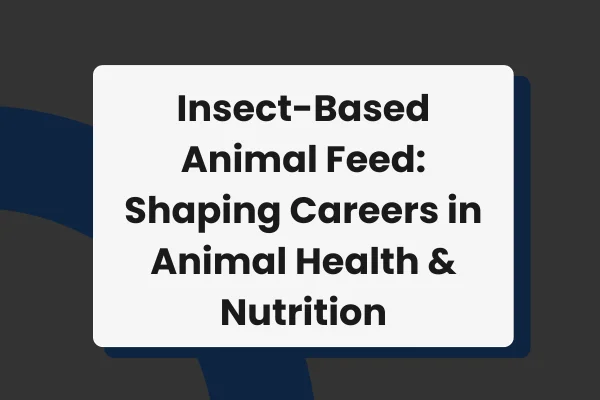
The integration of insect-based ingredients into animal feed is reshaping the animal health and nutrition industry. This shift is influencing production practices, supply chains, and regulatory frameworks, but it’s also creating new career opportunities and altering recruitment dynamics. Understanding these changes is essential for both professionals seeking to advance their careers and for employers looking to attract the right talent in this emerging sector.
The Rise of Insect-Based Ingredients in Animal Feed
Insects, particularly black soldier fly larvae and mealworms, are gaining prominence as sustainable protein sources in animal feed. They are rich in essential amino acids, fats, and micronutrients, making them suitable for poultry, swine, aquaculture, and pet food applications.
The insect-based feed market is experiencing significant growth, with investment in research, production facilities, and supply chains increasing rapidly. This growth is driven by the demand for sustainable and eco-friendly protein alternatives, as well as the need to reduce reliance on traditional feed ingredients such as soy and fishmeal. For employers, this expansion translates into a rising demand for specialised talent across multiple areas of the industry.
Impact on Recruitment in Animal Health and Nutrition
The adoption of insect-based feed ingredients is creating new roles and requiring unique skill sets. Professionals with expertise in entomology, sustainable agriculture, and insect farming are becoming increasingly sought after. Companies are also recruiting regulatory affairs specialists, quality assurance professionals, and production managers to ensure compliance with evolving standards and to scale insect feed production efficiently.
For job seekers, this presents opportunities to enter a sector that combines innovation, sustainability, and technical expertise. Candidates with experience in alternative protein sources, feed formulation, and regulatory compliance are particularly well-positioned to secure roles in research and development, production, and regulatory departments.
Recruiters in the sector are now tasked with identifying candidates who possess both scientific knowledge and practical experience in insect-based feed production. The ability to navigate this emerging industry is a key differentiator for talent acquisition strategies.
Regulatory Landscape and Its Influence on Employment
The use of insect-based ingredients in animal feed is subject to regulatory approval and oversight. Regulatory bodies are increasingly establishing standards to ensure safety, efficacy, and compliance. These updates impact the approval processes for insect proteins and affect market acceptance.
Professionals in the animal health and nutrition sector must be aware of these regulatory developments. Careers in regulatory affairs, compliance management, and risk assessment are becoming more prominent. Employers value professionals who can interpret legislation, guide ingredient approvals, and implement quality systems aligned with national and international standards.
This regulatory focus also affects hiring priorities. Candidates who can demonstrate knowledge of feed safety, product registration, and regulatory pathways are highly attractive to companies aiming to expand insect-based feed operations.
Future Outlook and Career Prospects
As sustainability and innovation continue to drive the sector, career opportunities in insect-based animal feed are expanding. Companies are increasingly recruiting for roles in research and development, production management, supply chain coordination, and sustainability strategy.
Professionals seeking to advance their careers should focus on developing expertise in insect farming technologies, feed formulation, and regulatory compliance. Adaptability and a proactive approach to understanding emerging industry trends will be critical to success in this evolving sector.
For recruitment experts, these developments highlight the need to align hiring strategies with market growth, ensuring companies can attract and retain talent with the right combination of scientific, operational, and regulatory skills.
The rise of insect-based animal feed is significantly influencing the animal health and nutrition industry. It is creating new career opportunities, reshaping recruitment priorities, and requiring professionals to develop specialised skills in entomology, sustainability, and regulatory compliance.
Companies that understand these trends and strategically plan for talent acquisition will be better positioned to innovate and scale in this emerging market. Professionals who invest in relevant expertise and remain informed about industry developments will find a growing number of roles aligned with sustainable and innovative feed production.
For more information on career opportunities and industry insights in animal health and nutrition, visit our Animal Health and Nutrition page.
Source: https://www.afia.org/news/afia-blog/what-is-the-buzz-about-bugs/




